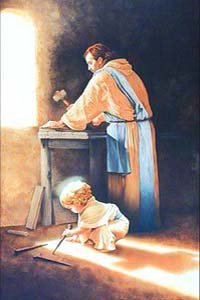Being God, Jesus could have chosen to be raised by anyone, at any time in history – a king, a merchant, a doctor, a professor… but He chose a humble carpenter to be His foster father.
St Joseph was of royal lineage, being of the line of King David, but like humanity, fallen far from its heavenly inheritance, Joseph was a long way from being a king. He was a “nobody”, a labourer from a backwater town in the vast Roman Empire. Not a single word of his was recorded in the Bible.
Yet, as guardian of the Holy Family, the first domestic church, St Joseph is now a patron of the Universal Church; and by his quiet example, he has much to say to us today. In Matthew’s Gospel, he is described as a “just man”. Archbishop Julian Porteous explains that a just man is:
“… one who assumes his responsibilities without complaint or reticence, who is self-sacrificing and generous in his assistance to others. He is a man who is concerned for those in need.
Such a man looks beyond his own interests and is directed to the interests of others, indeed, to the wellbeing of the community and the broader society.”

Against Communism
The feast of St Joseph the Worker was instituted by Pope Pius XII in 1955, against the Labour Day celebration created by communists, who supplant the family with the state, seeking to control every facet of human life through the government.
Maria von Trapp, of the Trapp Family Singers fame – depicted in the classic film, The Sound of Music (1965) – wrote a poignant reflection titled “The Land Without a Sunday”, observing how in Soviet Russia,
“The people work in shifts. While one group enjoys its day off, the others continue to work in the factories or on the farms or in the stores, which are always open. As a result the overall impression throughout the country was that of incessant work, work, work.
The atmosphere was one of constant rush and drive; finally, we confessed to each other that what we were missing most was not a well-cooked meal, or a hot bath, but a quiet, peaceful Sunday with church bells ringing and people resting after prayer.”
It can be tempting to become completely absorbed in work and let it take over your life, as a kind of idol. But God commanded us to keep the Sabbath Day holy (Exodus 20:8). God rested on the seventh day of Creation (Genesis 2:3). Our work is a participation in the ongoing redemption of fallen creation, and as image-bearers of God, we are called to imitate Him. Even machines need a break from work.
The Most Important Work

C.S. Lewis observed in a letter:
“I think I can understand that feeling about a housewife’s work being like that of Sisyphus (who was the stone-rolling gentleman). But it is surely in reality the most important work in the world. What do ships, railways, miners, cars, government etc. exist for except that people may be fed, warmed, and safe in their own homes? As Dr Johnson said, ‘To be happy at home is the end of all human endeavour’.”
In Catholic social teaching, we observe the principle of subsidiarity: “nothing should be done by a larger and more complex organisation which can be done as well by a smaller and simpler organisation.” The word economy comes from the Greek oikonomia, referring to the management of a household. The family is the basic unit of society; it is meant to be the main reason we work – to support the flourishing of the family.
Nowadays, sadly the family is often neglected in the pursuit of career. St Joseph models to us how to be a virtuous worker and father, putting his family first before all else, promptly obeying the word of God when told to take the pregnant Mary as his wife, to flee to Egypt, and later, to return to Israel. All this moving about with a pregnant woman and then a vulnerable baby menaced by Herod’s soldiers must have been quite stressful, but with his profound faith in God, Joseph simply and peaceably did what he was instructed to do.
A Blessing
Work may be experienced as a curse, an onerous task after the Fall (Genesis 3:17), but when you are doing a job you love, it can be a joy and a blessing. However you may feel about your work or studies, you can offer it all up for the glory of God and the relief of the Holy Souls in Purgatory.
St Thérèse wrote to her sister Celine:
“We must not let slip one single occasion of sacrifice. … Pick up a pin from a motive of love, and you may thereby convert a soul. Jesus alone can make our deeds of such worth, so let us love Him with every fibre of our heart.”
The Morning Offering
One way to dedicate your work to God is by praying the morning offering each morning when you awake:
O Jesus, through the Immaculate Heart of Mary,
I offer You my prayers, works, joys and sufferings of this day
for all the intentions of Your Sacred Heart,
in union with the Holy Sacrifice of the Mass throughout the world,
in reparation for my sins, for the intentions of all my relatives and friends,
and for the intentions of the Holy Father.
Amen.



























